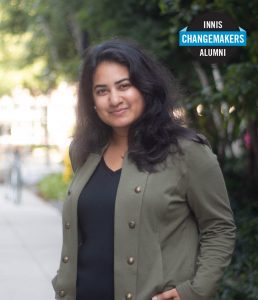She combines science and social justice to change women’s health for the better
A scientist and social justice activist, Ishita Aggarwal completed an HBSc (‘15 Innis) in cell and molecular biology, neuroscience, and psychology. She wears several hats, as a clinical research analyst at the Centre for Addiction and Mental Health (CAMH), the founder of two organizations dedicated to women’s health, and a research associate at the International Women’s Rights Project. And she is studying for a master’s in public health. Ishita has won widespread recognition for her work, including a 2018 Queen’s Young Leader award.

Just after graduation in 2015 you launched Mom’s The Word, a Canadian not-for-profit that hosts free prenatal workshops for expectant and new moms who have a low income or who are homeless. In the same year, you founded Pro-Bono Healers that connects sexual abuse and assault victims with obstetrician-gynaecologists and therapists. You obviously have a huge capacity to envision and act for change. What inspired you to do this?
I have always had an interest in women’s health and human rights. Having been born in India, where overt gender inequities continue to exist, my parents stressed the importance of professional and personal growth and development for both my brother and me. Hence, I grew up starkly aware of a variety of social injustices and developed a natural urge to help tackle them. When I entered my undergrad at U of T, I had multiple leadership opportunities, several of which were through Innis College. These positions allowed me to hone my communication, teamwork, and leadership skills and gave me the confidence to oversee increasingly complex projects.
Have you had any mentors along the way, and what’s the most important lesson you’ve learned from them?
I have been incredibly fortunate to have had two mentors, learning three major lessons from them. First, I learned that, when embarking on any task, it is important to do things the “right” way, not the “easy” way. In the long run, the easy road often has many more potholes.
Second, they have taught me that all of our limits are self-imposed. If there is something you really want to do, there is no reason why it can’t be done; all it may require is a reshuffling of priorities.
Finally, I have learned not to wait around for the “perfect” opportunity to come along. Say “yes” to all that interests you and figure it out later.
This was a particularly important lesson for me to learn because I’m not overly comfortable with uncertainty and it’s helped reduce my fear of the unknown.
Given what you’ve learned from the women you’ve encountered through your helping organizations, what’s the most important thing communities can do to change women’s lives for the better?
Organizations and institutions need to create more opportunities for women’s voices to be heard. We need more space for women (and people of all genders) in boardrooms and on public stages. Also, women in a community need to be consulted whenever a project impacting them is underway. Unfortunately, we continue to work on our communities when we should be working alongside them.
Real change, however, will only happen when we, as a people, demand more from our society. We need to change our rhetoric surrounding gender. Language is powerful. When we change how we speak, we change how our ideas are understood and acted upon.
What is the biggest challenge you’ve faced in your life so far and how did you meet it?
Transitioning out of university and into the working world was incredibly challenging for me. In school, I was accustomed to having guidelines and deadlines for everything I did. When I graduated, I quickly learned that this was no longer the case. There were so many more opportunities and paths I could take, yet far less direction. The sense of urgency was largely gone too. Although I am still figuring things out, I have learned to create structure in my life. For example, I set daily, weekly, monthly, and yearly professional and personal goals and review my progress on a quarterly basis. It helps me hold myself accountable.